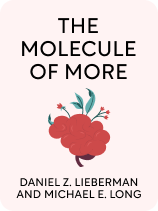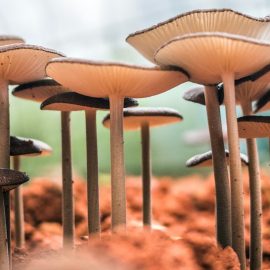

This article is an excerpt from the Shortform book guide to "The Molecule of More" by Daniel Z. Lieberman and Michael E. Long. Shortform has the world's best summaries and analyses of books you should be reading.
Like this article? Sign up for a free trial here.
What is The Molecule of More book about? How does it explain what dopamine is and how it works?
The Molecule of More by Daniel Z. Lieberman and Michael E. Long explains that dopamine motivates us to do things that we think will make us happy. Understanding how this works practically shows you the role dopamine plays in determining behavior, politics, and relationships.
Continue reading for key points from The Molecule of More book.
About The Molecule of More
Could a single molecule drive all of your ambitions, decide when you fall in love, and influence how you think? According to Daniel Z. Lieberman and Michael E. Long’s The Molecule of More book, the answer is yes; a chemical called dopamine is responsible for all of that and much more. In this book, Lieberman and Long explain the many ways that dopamine—a chemical your body naturally produces—affects your behavior, your emotions, and even your beliefs.
Lieberman is a practicing psychiatrist who specializes in treating addiction and emotional disorders like depression. He’s also the Senior Vice President of Mental Health at telehealth company Hims & Hers and a professor of psychiatry at George Washington University. In addition to his clinical and teaching work, Lieberman is a public speaker and a frequent guest on news networks such as CNN and ABC, where he discusses how neurology and biology affect human behavior.
Though trained as a physicist, Long is best known for his career as a writer and educator. He’s written everything from stand-up comedy routines—which he performed himself—to speeches for politicians, including members of the US Congress. He’s also the director of writing for Georgetown University’s graduate program in public relations.
This article starts by explaining what dopamine is and how it works. We’ll then discuss the many effects dopamine has on our thought patterns and our behavior, exploring how it affects individuals and the human race. Finally, we’ll conclude by explaining how some other chemicals in your brain work with—and against—dopamine, and why finding the right balance in your brain chemistry is the key to happiness.
Dopamine: The ‘What If’ Chemical
Lieberman and Long explain that dopamine is a neurotransmitter—a chemical for carrying signals between brain cells—that serves as both a motivator and a reward when you pursue new possibilities, or “what ifs.” Your brain releases dopamine when you encounter something new or unexpected, or when you make progress toward a personal goal. Furthermore, dopamine creates feelings of pleasure, so you’ll naturally want to pursue things that produce that dopamine high.
In short, dopamine drives you to learn new things, have unique experiences, and get what you want.
‘What If’ Versus ‘What Is’
Lieberman and Long explain that the human brain splits the world into two categories, which we’ll refer to as “what if” and “what is.”
“What if” means anything that would take effort to obtain. This category can refer to literal objects, like a bottle of milk that you need to go to the grocery store to get. However, it could also mean experiences you’d like to have or situations you’d like to be in; for example, meeting your favorite celebrity or starting a relationship with someone you’re attracted to. Dopamine motivates you to pursue things in the “what if” category.
How Dopamine Affects Behavior
Dopamine influences what you want and how much you want it, but how does it actually affect your behavior? According to the authors, it does so in many different ways, some of which are quite unexpected.
In this section, we’ll discuss dopamine’s effects on romantic interest (love), how it can influence your political beliefs, and why dopamine is the basis of creativity—as well as of some mental illnesses. We’ll also explore how dopamine affects your desires and decision-making.
How Dopamine Affects Romantic Interest
Lieberman and Long explain that the feeling of falling in love—the excitement and euphoria that sometimes seem to override logic—comes from your brain being flooded with dopamine.
This dopamine high happens because a new relationship is the basis of countless new “what if” scenarios, from fun date nights to buying a home and having children together. Since dopamine motivates you to pursue such possibilities, your brain responds to a new relationship (or even the chance of one) by producing huge amounts of it.
How Dopamine Affects Political Beliefs
Lieberman and Long say that your dopamine levels can influence your political leanings: The more dopamine you produce, the more progressive you tend to be. This makes sense when you remember that dopamine motivates you to explore new possibilities and try new things—by definition, that’s what progressives do.
How Dopamine Affects Creativity
Lieberman and Long say that dopamine drives creativity—it motivates you to think about exciting possibilities for the future and how you could turn those possibilities into reality. Strong motivation toward a particular goal causes you to make connections between things that seem unrelated and come up with innovative new ideas—in other words, to be creative.
For example, say you’re getting frustrated trying to remove stubborn adhesive residue. You might remember that citric acid can dissolve glue (as in Goo Gone). From there, you can connect the ideas of “citric acid,” “lemon juice,” and “adhesive remover,” and realize that you can use lemon juice to clean up the sticky residue.
Dopamine, Creativity, and Mental Health
Although dopamine has the positive effect of driving creativity, Lieberman and Long say that it’s possible to have too much dopamine—to be too creative and start making connections between ideas that really are unrelated. This is a common feature of mental illnesses like schizophrenia and paranoia, where someone might imagine some massive conspiracy because they’re inventing connections between unconnected events.

———End of Preview———
Like what you just read? Read the rest of the world's best book summary and analysis of Daniel Z. Lieberman and Michael E. Long's "The Molecule of More" at Shortform.
Here's what you'll find in our full The Molecule of More summary:
- How dopamine drives ambitions, determines love, and influences thought
- What exactly dopamine is and how it affects us
- How some chemicals, like serotonin, actively work against dopamine






